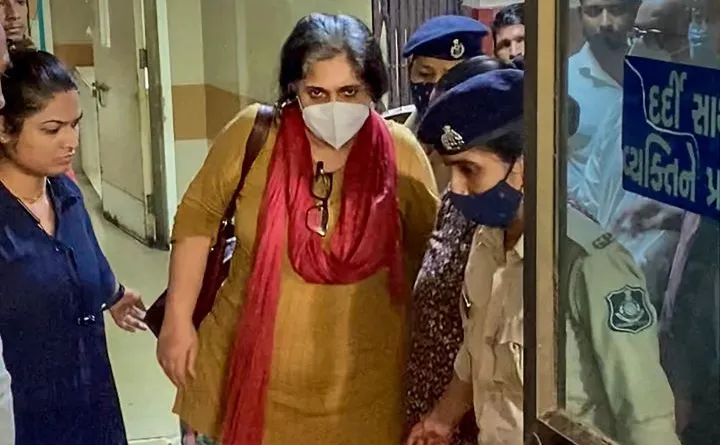If there was a Supreme Court judgment that cried out for reversal, it would be the one on arresting human rights activist Teesta Setalvad and former police officer RB Sreekumar. The verdict has been castigated by hundreds of eminent persons for turning the tables on petitioners for justice and treating them as the accused, not accusers.
Setalvad had pleaded that the Special Investigative Team (SIT) appointed by the Supreme Court in 2008 had erred in exonerating the Gujarat government of complicity in the 2002 riots, and the Supreme Court had erred in upholding the SIT in a 2014 judgment. She sought fresh investigations.
If the Supreme Court judges objected so strongly to old matters being brought up repeatedly despite exonerations, they could have dismissed Setalvad’s petition with a few withering remarks, or even refused to hear it. Instead, the judges themselves became accusers, charging the complainants of making false claims to create a ‘sensation.” Their verdict said, “as a matter of fact, all those involved in such abuse of process need to be in the dock and proceeded against in accordance with law.” Following this the police arrested Setalvad and Sreekumar.
My first reaction on hearing of the arrest was that the police must have misinterpreted the judgment. Justice Madan Lokur, former Supreme Court judge, said in an interview that he too initially felt the court could not have ordered Setalvad’s arrest, and hoped that the judges would issue a clarification to that effect. We were both wrong.
Lokur was asked what his reaction would be if it transpired that the judges had indeed sought Setalvad’s arrest. He replied, “Heaven help us.” Exactly so.
It is not the job of courts to seek the arrest of any person. That is the job of the police. Lokur has not come across any court demanding the arrest of any person, save in contempt-of-court cases.
The SIT in its 2009 report had accused Setalvad of making alse claims, inventing stories, and coaching witnesses. The court seems astonished that she has not already been prosecuted for this. But false claims and stories are common in millions of court cases. If the police went after every false claim, they would have no time for anything else. They normally leave anybody feeling falsely accused to sue the accuser. Why should this case be different?
Setalvad is hardly the only critic of the Gujarat government. In a 2004 judgment, two judges of the Supreme Court slammed the Gujarat government for being a “modern-day Nero looking somewhere else when Best Bakery and innocent children and helpless women were burnt.” A Concerned Citizens Tribunal headed by former Supreme Court Justice V K Krishna Iyer also slammed the Gujarat government. Should all these worthies be prosecuted along with Setalvad?
The court has also lambasted Setalvad for having “the audacity to question the integrity of every functionary involved in the process.” Sorry, but such audacity is a fundamental right in liberal democracies. Citizens must be able to complain against official unctionaries, question their motives, and seek redress. They can do so repeatedly after endless exonerations in liberal democracies the world over.
Consider the assassination of US President John Kennedy. The official investigation concluded that Kennedy was shot by Lee Oswald without any accomplices, and Oswald in turn was shot by Jack Ruby without any collaborators. Since critics heatedly contested the official version, the US President set up an inquiry commission headed by Chief Justice Earl Warren. This accepted the official version and rejected rival conspiracy theories.
Next in 1968 Attorney General Ramsay Clark appointed a panel to re-examine the medical evidence. The controversy continued, so in 1975 President Ford set up the Rockefeller Commission to examine rival theories. Next in 1975 the Church Committee of Congress investigated the functioning of the CIA and concluded that the FBI and CIA failed to give the Warren Commission all relevant data. Another Congressional report in 1979 suggested that Kennedy was probably killed by a conspiracy. Several writers including Jim Garrison and Jim Marris wrote best-sellers alleging conspiracies. Based on these Oliver Stone made the film ‘JFK’ which won two Oscars. In response, Congress enacted the JFK Act and created the Assassination Records Review Board to gather and archive all materials.
No court or politician had the audacity to object to the constant raking up of old charges, constant attacks on the integrity of functionaries, or constant contestation of exoneration by earlier bodies. People espoused hugely different theories, but no one suggested arresting anyone for making false claims or inventing bizarre stories. All viewed multiple rival theories, however bizarre, as normal in a democracy. India should follow the same approach.
This article was originally published in The Times of India on July 3, 2022


